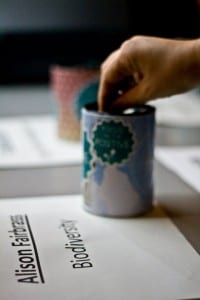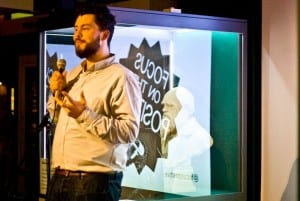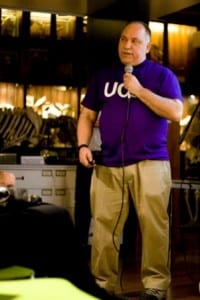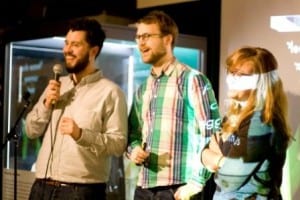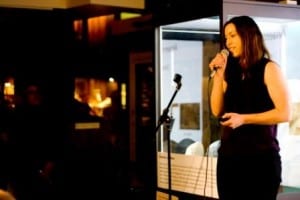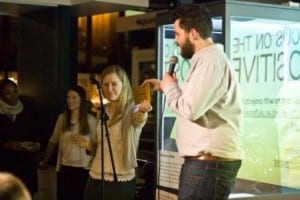Focus on the Positive
By Dean W Veall, on 11 March 2014
We’ve hosted a variety of events (film nights, game shows etc) in the Grant Museum
but none have been quite like Thursday 27th February’s event. That event saw our speakers talking about Crystal Palace Dinosaurs, London’s bats, faecal digesters and molecular biology all trying to cajole, convince and in one case bribe the audience to win the £2,000 prize. The event in question was Focus on the Positive.
Engaging the public
Here at UCL we have researchers working on a wide array of subjects, everything from nano-technology to fine art, Scandinavian studies to medicine and we want to engage the public with that research. We have long drawn upon this talent to enrich the Museum’s public events programme, using some of the very best researchers to share their work with our keen following of visitors. We’ve had Joe Cain shining light on some brilliantly awful b-movies, Kate Jones discussing the potential for technology to change the way we think about wildlife conservation, Mark Maslin discussing human population and Steve Jones sharing his thoughts on evolution, to name a few.
But what does it mean to engage the public with research? One way is indeed sharing and telling people about your research, but it can be a fairly passive experience; the challenge is to encourage people to actively have a stake and take an interest in your work. And that is exactly what Focus on the Positive aimed to do.
Focus on the Positive
The format was devised by the brilliant team at theUCL Public Engagement Unit and is a simple one, researchers have to pitch to the audience their ideas for making a change in the world based on their research and the audience votes to decide who gets £2,000 to make their ideas happen. We were keen to get in on the action and give our audience a chance to engage with some brilliant research activities here at UCL.
On the night a lively audience were given the criteria they should judge each project against:
- Is it value for money? – was the project the best way to spend this pot money?
- Is it realistic? – with the cash, would they actually achieve what they aspired to?
- Is it a worthwhile endeavour?– would the project actually make a difference?
With that in mind, and voting tokens in hand, we heard four very different pitches for the £2,000 prize.
Crystal Palace Dinosaurs
First up was Joe Cain. Joe was asking for the cash to save the Crystal Palace Dinosaurs. These marvels of Victorian construction are listed monuments housed in the grounds of Crystal Palace Park and date back from the time of the Great Exhibition in 1851. Neglected over the years and falling apart these historically important beasts are in need of attention and Joe was pitching for the cash to start a fundraising campaign that would raise £1.5 million to save them before they become lost forever. His impassioned pleas were illustrated with harrowing images of these crumbling monuments.
Darwin’s Toolbox
Next up was Philipp Boeing from the project Darwin’s Toolbox. Philipp and his colleague Bethan Wolfenden are both undergraduates and were pitching for their idea of creating a biotech lab in a portable toolbox sized suitcase. They wanted to spend the money turning their prototype toolboxes into working pieces of equipment that would be affordable and easy to use and could be utilised in settings such as schools to inspire young people to get involved with real molecular and synthetic biology.
Faecal digester
Following Philipp and Bethan, and hoping to win the cash was another undergraduate, Cecilia Isven. She wanted the cash to help change the world with poo, starting with Surrey Docks Farm. She wanted to use the money to help install a boiler to run an anaerobic manure digester, turning the copious amount of animal waste into energy to run the farm.
A London wildlife health check
Completing the line-up for the evening was Alison Fairbrass, a PhD student from the Engineering department. Alison’s research focus is on the bio-diversity of towns and cities; the urban landscape. She was pitching for votes to give London a wildlife health-check, carrying out wildlife surveys to discover exactly what animals we share our city with and with that information help us look after our green spaces better.
And the winner is…….
Four very different projects, very different speakers at different stages of their research careers, so, who won? When the votes were counted and the results in, the winning project was…… Darwin’s Toolbox. Philipp and Bethan convinced the audience with their aspiration to bring biotechnology to the masses. But coming in runner-up position and walking away with £1,000 was Alison Fairbrass.
Next event
Focus on the Positive was a brilliant example of public engagement with UCL’s research that trusted the audience to decide where funds could be spent. The money came from the Engineering and Physical Science Research Council and has funded projects that will have a positive impact on society. Over the coming months we will bring you updates on how these projects progress. If you couldn’t make it to the Grant Museum event, fear not Focus on the Positive is back on May 13th at the Dana Centre.
To follow the projects as they take shape and to see when future events will be happening head to the Focus on the Positive page
Dean Veall is Learning and Access Officer at the Grant Museum of Zoology
 Close
Close


